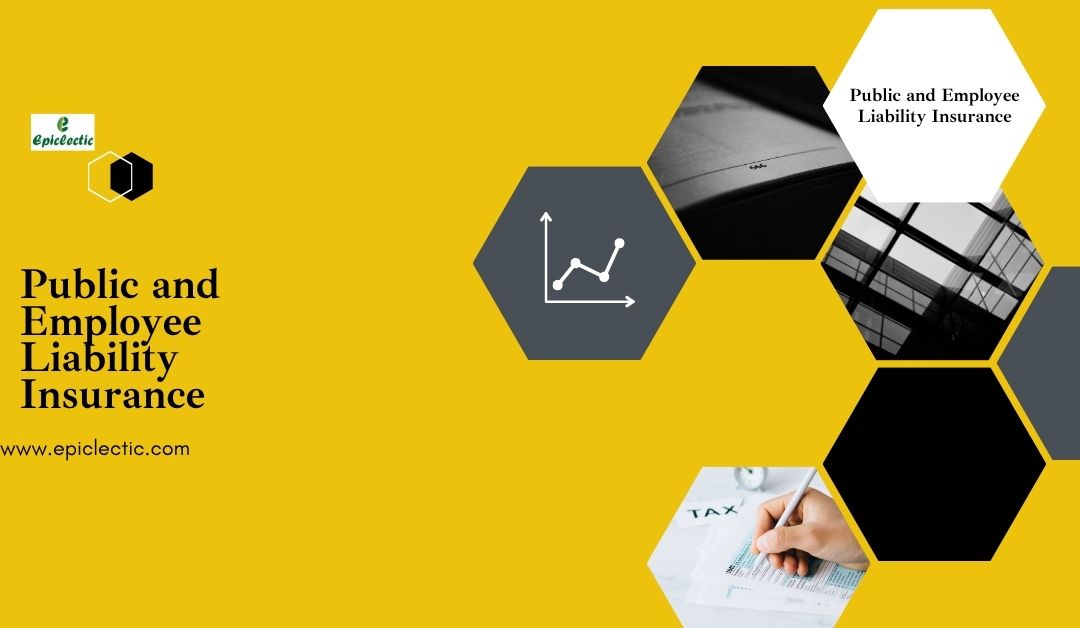Public and Employee Liability Insurance is essential protection for businesses across the UK, whether you’re a sole trader, a growing startup, or a well-established company with staff.
Public liability insurance protects your business if an outside party—such as a customer or visitor—is hurt or their property is damaged due to your business operations.
Although both insurance types are designed to safeguard your business, they focus on distinctly different — but equally important — areas of protection. In contrast, employer’s liability insurance is designed to protect you if one of your own employees is hurt or becomes ill due to something related to their job.
In the UK, having the right liability insurance isn’t just a smart move—it can be a legal requirement. Whether you’re hiring staff or interacting with the public, this coverage helps shield your business from potentially devastating legal costs and compensation claims. In this guide, we’ll break down the differences, explain who needs what, explore legal obligations, and help you decide the best way to protect your business.
What is Public Liability Insurance?
This type of insurance shields your business when third parties experience harm or property loss caused by your operations—covering everything from lawyer fees to awarded damages.
Whether you run a local shop, work as a self-employed plumber or operate an events company, if you interact with the public in any way, public liability cover can save you from significant financial losses.
Who Needs It and Why?
If your business involves any interaction with members of the public—clients visiting your premises, deliveries, or even working in someone’s home—public liability insurance is highly recommended.While it’s not legally required in the UK, many clients and contracts may insist you have it in place before they’ll work with you.
If your business deals with members of the public in any way, having public liability insurance is a smart move to guard against potential claims for injury or property damage.
Examples of who might need it include:
- Shop owners
- Freelancers working on-site
- Tradespeople (like electricians, decorators, etc.)
- Event organisers
- Cafés, salons, and hospitality venues
What Does It Cover?
- Public liability insurance generally provides cover for situations where someone outside your business gets hurt—
- such as a customer slipping on a wet floor at your premises—
- or when your work accidentally causes damage to another person’s property, like a contractor accidentally smashing a client’s window.
- Legal defence costs if a claim is made against your business
- Compensation payouts if you’re found liable
Some policies may also cover incidents at exhibitions, trade shows, or public events.
Is Public Liability Insurance Mandatory in the UK?
Public liability insurance isn’t legally required in the UK, but it’s strongly recommended for businesses that interact with the public.
That said, many businesses still consider it a must-have—particularly those that regularly operate in public areas or provide services directly to clients in person.
Additionally, local authorities, landlords, or clients may require you to have it before granting permission to operate or enter contracts.
Public liability insurance isn’t required by law in the UK, but it’s often contractually required and highly recommended for financial protection.
What could happen if my business operates without public liability coverage?
If you don’t have public liability cover and someone makes a claim against you, you could be personally liable for thousands—or even millions—of pounds in compensation and legal fees. Without this insurance, your business (and personal assets) could be at serious risk.
What is Employer’s Liability Insurance?
The vast majority of UK employers are required by law to maintain employer’s liability protection.
This coverage is designed to protect your company in case an employee suffers an illness or injury linked to their job and decides to take legal action.The policy covers your court costs and potential compensation payments.
Whether your team consists of full-time staff, part-time workers, volunteers, or even apprentices, this cover is essential to keep your business compliant and protected.
Why Is Employer’s Liability Insurance Legally Required?
In the UK, most businesses must legally have employers’ liability insurance, as mandated by the Employers’ Liability (Compulsory Insurance) Act 1969. This law is in place to make sure employers can financially support their staff if they become ill or injured due to work-related incidents.
If you hire even one employee, you’re legally required to have cover of at least £5 million. Most insurers automatically provide this level of cover or more.
If your business has any employees in the UK, the law mandates that you carry employer’s liability insurance. You risk facing substantial financial penalties if you don’t have this protection in place.
The only exceptions are:
- Sole traders who don’t employ anyone
- Family businesses where only close relatives work
- Public organisations (like government departments)
What Situations Does It Cover?
Employer’s liability insurance is there to support your business when something goes wrong in the workplace. For example, if an employee slips on a wet floor and breaks a leg, or a team member develops repetitive strain injury due to poor workstation ergonomics, your policy steps in. It also applies in more serious cases, like a warehouse worker getting injured because of faulty equipment. In all these situations, the insurance helps cover legal defence costs, medical bills, and any compensation you’re required to pay if you’re found liable. Even claims that arise years later—from former employees—can still be valid, which makes ongoing protection not just smart, but essential.
What’s at risk if I operate without employer’s liability protection?
If a business operates without valid employer’s liability insurance, the Health and Safety Executive (HSE) can issue a daily fine of £2,500 for every day the business remains uninsured.
You could also face a £1,000 fine for not displaying your insurance certificate or failing to provide it when asked.
Main Distinctions Between Public Liability and Employer’s Liability Insurance
While public liability and employer’s liability insurance may seem alike at first, both offering protection against legal claims, they actually cover different types of risks for your business.
But they cover very different risks, and it’s important to understand how they’re not interchangeable.
This insurance safeguards your business against compensation claims from anyone affected by your operations, including clients, suppliers, or even bystanders who experience harm.
For example, if someone trips over a loose cable in your shop and breaks an ankle, your
public liability policy would help cover the legal costs and compensation.
This coverage safeguards your business against injury or damage claims from the public – whether they’re clients, delivery people, or just someone walking by your premises.
Simply Put: Your employees are covered under employer’s liability, whereas the public falls under public liability protection.
Side-by-Side Comparison: Public vs Employer’s Liability Insurance
|
Feature |
Public Liability |
Employer’s Liability |
|
Who it covers |
Members of the public, customers, visitors |
Your employees (full-time, part-time, temp, etc.) |
|
Is it legally required? |
No (but often required by contracts or clients) |
Yes, if you employ staff (minimum £5M cover) |
|
Example incident |
Customer trips over toolbox and gets injured |
Staff member develops back pain from lifting boxes |
|
Covers legal + compensation? |
✅ Yes |
✅ Yes |
|
Common for these businesses |
Retail, tradespeople, event organisers |
Any business with employees, including volunteers |
Do I need both public and employer’s liability insurance?
If you interact with the public and employ staff, then yes, you should absolutely have both. They protect different areas of risk, and having just one may leave you dangerously exposed. Many businesses combine both policies in a single insurance package for simplicity and cost-effectiveness.
Who Is Legally Required to Have These Insurance Policies in the UK?
When it comes to running a business in the UK, knowing which insurance you’re legally required to have—and which ones are just strongly recommended—can save you from costly fines and legal headaches.
Here’s the simple truth: if your business has even a single employee, you’re legally obligated to have employer’s liability insurance.
This includes full-time staff, part-timers, casual workers, apprentices, and even volunteers. Unless you’re employing close family members in certain types of businesses, you’re required by law to have at least £5 million in cover.
Public liability insurance, however, isn’t legally required. That said, it’s still something you shouldn’t overlook.Many UK businesses still need it because it’s often required by clients, landlords, or local councils before you can start a job, sign a contract, or hire a venue. And from a financial perspective, having cover can protect you from claims that could otherwise bankrupt a small business.
Key Point:
Businesses with employees must have employer’s liability coverage by law.
On the other hand, public liability insurance isn’t mandatory, but it’s strongly recommended for any business that deals with the public.
Here’s who typically needs each type of insurance:
- Sole traders: Not legally required to have either, but public liability is highly recommended if you deal with clients face-to-face or work in public spaces.
- Public liability insurance isn’t compulsory, but many businesses find it essential based on the type of work they do.
- Freelancers or contractors: No legal requirement, but public liability insurance can protect against costly third-party claims.
- Employers with volunteers or temps: Still need employer’s liability cover—even unpaid staff are included under UK law.
Trades and public-facing roles: Anyone who works in homes, shops, offices, or at events should consider public liability as essential.
Is liability insurance required for sole traders in the UK?
No, sole traders are not legally obligated to carry liability insurance.But if your work involves visiting clients, working in public, or having customers on-site, public liability insurance is strongly advised. One accident could result in a claim worth thousands, and without insurance, you’d have to pay it out of pocket.
What Are the Costs of Public and Employer Liability Insurance?
The price you pay for public and employer liability insurance in the UK can differ significantly. Several elements impact the total cost, including the type of work you do, how many employees you have, and the level of risk involved in your day-to-day operations.
For instance, a freelance graphic designer working remotely will typically pay much less than a construction firm managing a crew on-site.
That’s because insurers assess the risk of potential claims when calculating your premium.
Public liability insurance can start from around £50 a year, while employer’s liability cover typically starts at £100–£200 annually—but costs rise with more employees or higher-risk work.
What Factors Affect the Cost?
Several key factors influence how much you’ll pay for public or employer’s liability insurance.Your business sector plays a major role in determining your insurance premiums. Businesses that operate in higher-risk sectors like construction, manufacturing, or events generally face steeper premiums than those in lower-risk fields such as IT, marketing, or consulting.The scale of your business matters too—particularly when it comes to how many employees are on your team. Naturally, the more staff you employ, the more you’ll pay for employer’s liability cover.
Most businesses opt for between £2 million and £10 million in public liability protection, and the more cover you request, the higher your premiums will be. Insurers also take your claims history into account. A track record of multiple previous claims can result in increased insurance premiums, as insurers view it as a sign of higher risk.z
Similarly, your company’s annual turnover might influence your rate, as it can be an indicator of how active or exposed your business is.
When it comes to general pricing, public liability insurance for small businesses or sole traders typically starts from around £50 to £200 per year, but this can rise depending on your specific risk level. Employer’s liability insurance is usually a bit more, with annual premiums ranging from £100 to £500 or more, depending on the number of employees, type of business, and any history of claims. A number of insurance providers offer bundled policies that include both public and employer’s liability cover—often at a lower cost than purchasing each one individually.
What factors affect liability insurance costs in the UK?
Liability insurance pricing in the UK is influenced by a range of factors, such as the type of industry you’re in, how many employees you have, any past claims you’ve made, and the level of coverage your business requires.
Businesses in higher-risk sectors usually pay more than those in office-based or low-risk fields.
Finding the Right Liability Insurance for Your Business
Selecting the right liability insurance goes beyond simply meeting legal obligations—it’s about ensuring your business is well-protected if something unexpected happens.
Whether you’re a sole trader, a small team, or a growing company, the right policy can make all the difference if a claim ever lands on your desk.
Begin by considering the day-to-day activities of your business and the specific type of work you perform.If you work directly with customers, clients, or the public—say, you run a café, offer home repairs, or attend trade shows—then public liability insurance should be high on your list. It provides financial protection if a person gets hurt or their belongings are damaged as a result of something your business does.
Make sure your policy provides at least the minimum £5 million in cover, which most reputable insurers will include as standard.
Then, consider the particular risks that your business might encounter.For example, do you work in a hazardous environment? Do you drive to customer sites or host visitors at your premises? Your choice of coverage type and level should be guided by the specific risks your business faces.
Avoid selecting the cheapest option without checking the details.Be sure to know exactly what your policy covers, how the claims process works, and any possible exclusions that may apply.
It’s also smart to compare quotes from multiple providers, and don’t hesitate to speak with a broker if your business has unique needs. Many insurers now offer tailored policies that combine public, employer, and even professional liability insurance into a single package—often at a better rate than buying them separately.
Finally, always read the small print. Understanding your policy now can save you a lot of stress later if you ever need to make a claim.

Where Can You Buy Public and Employee Liability Insurance in the UK?
Getting public and employer’s liability insurance in the UK is easier than ever—and you don’t have to leave your desk to do it. Thanks to online comparison tools, brokers, and specialist insurers, you can find and buy a policy that suits your business in just a few clicks.
If you’re after a quick, no-fuss option, comparison websites like Compare the Market, MoneySuperMarket, or Simply Business allow you to view a range of quotes from different insurers side-by-side. These platforms are ideal if you want to compare prices, levels of cover, and optional extras without having to contact each insurer individually.
Alternatively, you can go directly to well-known insurance providers such as AXA, Direct Line, Hiscox, or Aviva. Many of these companies offer tailored business insurance packages that combine both public and employer’s liability insurance under one policy—saving you time and, often, money.
If your business has unique or higher-risk requirements—like working at heights, dealing with hazardous materials, or managing a large workforce—it may be worth speaking to a business insurance broker. A broker can help assess your risks, recommend the right level of cover, and often find deals that aren’t available to the public.
Make sure your chosen provider is FCA-authorised and offers coverage limits that meet both your legal and operational needs.
Some insurers even offer flexible monthly payment plans, policy adjustments as your business grows, and 24/7 claim support—so be sure to look at the service as much as the price.
FAQs About Public and Employer’s Liability Insurance
Still have questions? You’re not alone. Here are some of the most commonly asked questions UK business owners have when it comes to public and employer’s liability insurance—answered simply and clearly.
Q: What if I work from home—do I still need liability insurance?
Definitely—it’s entirely possible. Operating your business from home doesn’t eliminate the risks involved. For example, if a client comes to your home office and gets injured, public liability insurance can offer you protection.Similarly if you have anyone helping you—even casually—you may still be legally required to have ,employer’s liability insurance, depending on the situation.
Q: Can I combine both types of liability insurance into one policy?
Absolutely. Numerous insurance providers offer bundled business insurance plans that cover both public and employer’s liability. Combining coverage into one policy is usually easier and can save you money compared to purchasing multiple separate plans.
Plus, managing your cover is simpler when it’s all in one place.
Q: Is there a difference in liability insurance for charities or nonprofits?
Yes, but only slightly. Charities and non-profit organisations often need the same types of cover, especially if they employ staff or deal with the public. However, some insurers offer specialist packages tailored for the voluntary sector, which might include lower premiums or added protection relevant to charitable work.
Q: Do volunteers count as employees under UK law?
In many cases, yes. Even though volunteers aren’t paid, the law still sees them as people under your care. That means you may still need employer’s liability insurance if volunteers help with your operations.
Q: How quickly can I get covered?
Very quickly. With most online providers, you can get a quote, choose your level of cover, and download your certificate of insurance within minutes. Some policies even offer instant cover from the moment you pay—perfect if you’re starting a new job or need proof of insurance urgently.
Conclusion: Why Liability Insurance Matters and What to Do Next
Operating a business in the UK means liability insurance isn’t merely a legal formality—it’s a vital safeguard for all that you’ve invested time and effort into creating.Whether you run a small shop, work as a freelancer, or manage a growing team, public and employer’s liability insurance helps shield your business from unexpected legal claims and expensive compensation payouts.
Public liability insurance gives you peace of mind when working with the public, while employer’s liability insurance keeps you compliant with UK law and protects your employees if something goes wrong. Together, they form the safety net your business needs to operate confidently, no matter what comes your way.
If you deal with the public or employ staff, having the right liability insurance could save you from serious financial loss—and even legal trouble.
So what’s next? If you’re not already covered, now’s the perfect time to compare quotes, speak with a trusted broker, or contact an insurance provider that understands your industry. Many insurers even offer combined packages tailored to small businesses—saving you time, money, and hassle.
Ready to protect your business?
Start by comparing public and employer liability insurance quotes today—and give your business the protection it truly deserves.




